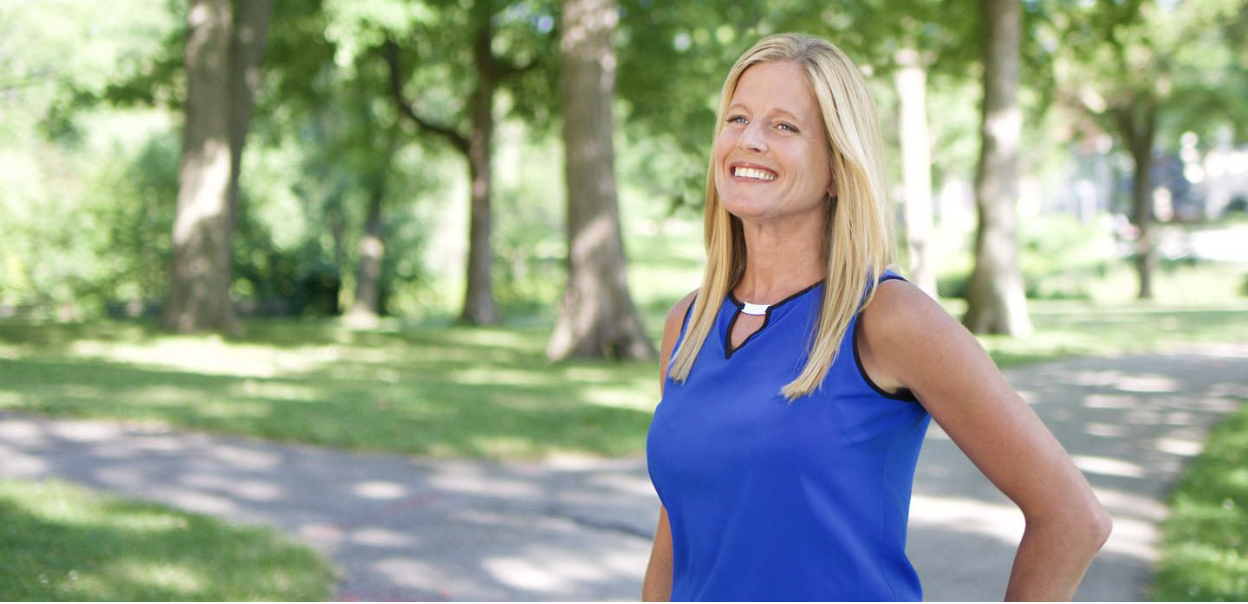Lifestyle
Kristin Ihle Helledy Shares Advice for Up-and-Coming Runners

When you visit with Kristin Ihle Helledy, her passion quickly becomes apparent. Like the joy of crossing the finish line first, her love for the sport of running is second to none. The Ph.D. in multicultural psychology is a six-time All-American runner who competed professionally as a Nike athlete. She pushed her mind and body to limits she didn’t even know existed.
She wants young runners to control the controllables and not let doubt and other thoughts creep in. “Here’s what I can control: my calm, my focus, and execute the plan that has been established,” she says.
Kristin Ihle Helledy was very young when she heard the crack of her first starting pistol. She was living in Florida when she heard an announcement about a mile-and-a-half fun run at her junior high school. She didn’t even know how to measure that distance, but she was intrigued. The school was giving out Coca-Cola products to the winner. Come in first place, leave with T-shirts and various goodies. She was sold.
She’d never run a lap in her life. She didn’t even have running shoes. She wore canvas sneakers with rubber bottoms and did not even know how far 1.5 miles actually was. That didn’t stop her; she was motivated.
“And so I thought, yeah, I want that Coke T-shirt,” she recalls.
The first-time runner went out, ran the race — and won it. She beat all the other competitors, both girls and boys. And that was her introduction to running. The coach recruited her for cross-country and the rest is history. She calls it, “a pure freak accident that just happened.” If Coca-Cola weren’t offered as a prize, we wouldn’t be here right now.
Hitting Her Stride
Today, Kristin Ihle Helledy uses her athletic and educational experience to strengthen others. She started a management consulting firm, Avant, to consult for NCAA teams and individual athletes. Her firm, Avant, works with businesses and leaders from all industries to accelerate performance, evelbate leader effectiveness and advance team capabilities. She also consults with a wide range of NCAA athletes and programs to enable performance and growth.
The nostalgia of the sport she loves keeps her vested in the successes of others. Whether it’s fans or beginning runners, she wants everyone to enjoy the experience. She believes fans are getting a chance to watch the best athletes in the world.
Experienced runners are already hitting their stride when it comes to training and exercise. They have their routines down. Kristin Ihle Helledy would advise up-and-coming runners to slow down in order to climb the ranks.
“I think if they’re very young, under the age of 18 or 19, I think: Be patient. Be focused and have a select person or persons to whom you listen. Everybody’s going to have an opinion. When you’re talented at a young age everybody wants a piece of you. So I would say find that one trusted person, listen to him or her, work to keep things simple and avoid overtraining,” says Kristin Ihle Helledy.
‘More Is Not Better’
Imagine advising a runner to slow down. But the thought behind that advice is that young athletes try to do too much at once.
“There’s this general sentiment, in life, that ‘more is better’. If a little is good then more must be better. And physiologically it doesn’t work that way, more is not better,” she says.
Just because you feel like you can get more miles in, it doesn’t mean you should. Maybe recovery would help you better achieve your goals. You’re not trying to slow down your running times; you’re trying to train more effectively. So she advises applying what’s called stress adaptation – load your body with heavy duty training and then give it time to repair.
“Go ahead and load your body real hard, do a hard training day, whatever that is, and then make sure that you recover and understand that more is not better. What that means is you do not need to do back to back hard workout days. The body must recover so you can hit it hard again,” says the seasoned veteran, whose favorite event is the women’s 400-meter hurdles.
Kristin Ihle Helledy appreciates the speed, speed endurance, and technique all wrapped into that one event (400m hurdles). Anything from considering how many steps to take between hurdles to the speed of the foot race itself. It’s not a flat-out sprint, like the open 400. It’s an extremely taxing event — and her favorite.
Her days of competitive running at an elite level are over, but she knows what it takes for today’s runners to be successful. She still gets energized watching others compete. And she always cheers for Nike athletes.
“I’m still Nike — Nike’s the only thing I wear for footwear,” she says. “Being a fan is intense and exciting and it brings goosebumps, and you want to go out there to help push somebody along to a new personal best.”
Lifestyle
From Broken to Whole: The Radical Reawakening Behind The XI Code

Elle dela Cruz
Most healing begins with the assumption that something is broken. That the fix lies in the right therapist, diet, retreat, or ritual. Patchwork solutions for a fragmented self.
But for clients of The XI Code, the breakthrough did not come by fixing what was broken, it came by remembering what was never damaged to begin with.
It is not a spiritual placebo or self-help remix, rather a recalibration, a return, a radical stripping away of every distortion that ever claimed authority over who you are. Founded by Masati Sajady, The XI Code has become a sanctuary for those who sensed there had to be more and now live the proof of it.
This is not talking about polite gratitude or glow-up affirmations, these are accounts of full-system transformation, physical regeneration, identity coherence, and a kind of inner homecoming that makes every previous attempt feel like a rehearsal.
“This isn’t about self-help,” says Masati. “This is about self-realization. There is a version of you untouched by pain, trauma, or time and that is what XI reveals.”
Remembering the Self Beneath the Static
Those who enter the XI space often describe their experience not as something new they learned but as something ancient they finally remembered. One client shared: “I listened to Masati’s podcasts during a bottomless depression. I swear it pulled me from the dark to the light.”
But the words they use are not mystical or out of reach, rather grounded. “I feel safe in my body.” “I’ve come home.” “I finally see myself.”
This is not a performance of healing, it is a quiet, cellular knowing.
“I survived death and decoded life,” Masati explains. “I returned with the blueprint for those ready to rejuvenate the body, unlock peak performance, and evolve humanity.” Those words, radical to some, feel like a memory to others. As if, somewhere deep inside, they always knew this was possible.
When the Body Starts Listening
While XI is not a medical protocol, many clients describe physical transformations that coincide with their inner shift. One wrote: “I’ve begun rendering myself as my highest form, right here, in this space and time continuum.”
Another called it “the most effective healing method” they had found after years of traveling the world for answers. But the common thread was coherence. A recalibration across dimensions: physical, emotional, energetic, and ancestral. It is about resolving distortion at the origin point.
Rewriting the Lens of Reality
After engaging with The XI Code, many report not just feeling better but seeing life differently. Like a veil lifted. Like their perceptual field was reset.
One wrote: “My whole life is changing in every way and it’s just unfolding on its own. Every day, synchronicities. It’s like magic.”
Another put it simply: “I found my home and I wasn’t even looking.” Again and again, the word home appears in these testimonials not as a destination but as a state of being.
Masati explains this with precision: “XI doesn’t upgrade the version of you that’s broken. It reveals the YOU that was never broken to begin with.”
A Quiet, Powerful Community
Though The XI Code is not marketed as a group program, many clients describe a shared energetic field as being held by a collective intelligence moving through similar layers.
“I can’t wait to wake up and see how much more beautiful I’ve become,” one said not from ego but from evolution.
Because the work does not stop when the session ends. The system keeps unfolding, recalibrating, and upgrading.
Not for Everyone But For the Ready
Masati is unapologetic: “The XI journey requires the courage to see Truth on all levels, in all arenas, and to accept responsibility for the Life you’ve been gifted.”
It is not for those seeking a new story to believe in, rather for those ready to remove every distortion that ever told them they weren’t enough.
And what remains? The version of you before distortion and the one that was always whole.
You do not need to become someone new. You need to meet who you were before the noise.
-

 Tech4 years ago
Tech4 years agoEffuel Reviews (2021) – Effuel ECO OBD2 Saves Fuel, and Reduce Gas Cost? Effuel Customer Reviews
-

 Tech6 years ago
Tech6 years agoBosch Power Tools India Launches ‘Cordless Matlab Bosch’ Campaign to Demonstrate the Power of Cordless
-

 Lifestyle6 years ago
Lifestyle6 years agoCatholic Cases App brings Church’s Moral Teachings to Androids and iPhones
-

 Lifestyle4 years ago
Lifestyle4 years agoEast Side Hype x Billionaire Boys Club. Hottest New Streetwear Releases in Utah.
-

 Tech7 years ago
Tech7 years agoCloud Buyers & Investors to Profit in the Future
-

 Lifestyle5 years ago
Lifestyle5 years agoThe Midas of Cosmetic Dermatology: Dr. Simon Ourian
-

 Health6 years ago
Health6 years agoCBDistillery Review: Is it a scam?
-

 Entertainment6 years ago
Entertainment6 years agoAvengers Endgame now Available on 123Movies for Download & Streaming for Free
